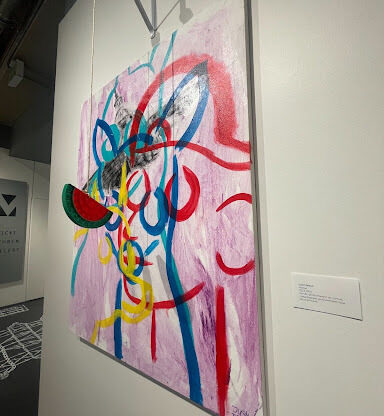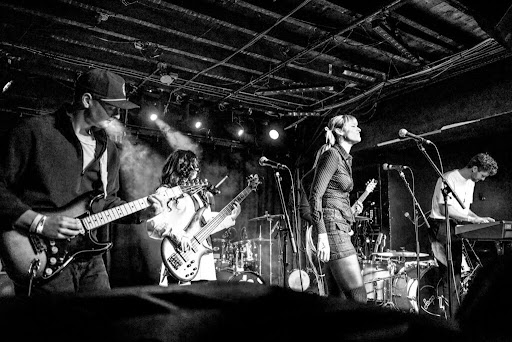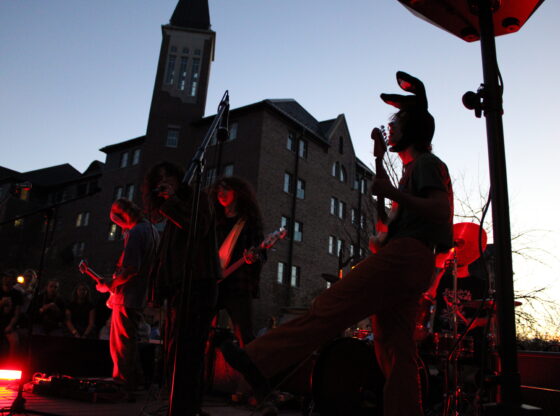[SPOILERS INCLUDED. Trigger warning for sexual assault.]
Filmmaker Zach Cregger has certainly made a box office splash with film directorial debut, “Barbarian.” Released on Sept. 9, 2022, and starring Bill Skarsgard, Georgina Campbell and Justin Long, this suspenseful horror gem has scored a resounding 92% on Rotten Tomatoes. This movie conceptualizes real life fears of male supremacy, abuse, trauma and stranger danger.
“Barbarian” sends you down a winding staircase of twists and turns, keeping you on the edge of your seat until the credits roll. “Barbarian” uses misogyny and male entitlement as a vehicle for the plot. Cregger uses this almost universal fear of what men can do and turns it up to the maximum. The movie doesn’t need to rely on jumpscares to keep the audience guessing; suspense becomes one of the most powerful tools in Cregger’s tool box. The first act builds on a snowball effect. The viewer is introduced to our main protagonist, Tess (played by Georgina Campbell), a cautious yet assertive young woman. She embodies the spirit of final girls like Ellen Ripley, Sidney Prescott and Nancy Thompson with her curiosity, strong demeanor and raw instincts. This nature is displayed within the first 15 minutes of the movie when we are introduced to Keith (played by Bill Skarsgard), a stranger who happened to book the same Airbnb as Tess. The movie leads the audience to believe that Keith shouldn’t be trusted from the get-go. He avoids eye contact with Tess frequently, stumbles over his words, continues to offer her drinks and seems insistent on having her spend the night.
Cregger continually manipulates the audience with sound mixing and utilizing diegetic sounds to have the viewer’s heart rate rise. Cregger also uses asymmetrical wide shots to swallow the characters and audience in the eerie darkness of 476 Barbary Street. The film taps into the paranoia of the characters as well. When Tess wakes up to find her door open and Keith’s visceral reaction to his nightmare, the movie leads the viewer astray in believing Keith is still suspicious. Cregger wants the viewer to fear Keith and for Tess’s wellbeing. “Barbarian” gives you whiplash moving from the end of its first act to the beginning of the second. The last few minutes of act one conclude with the discovery of a hidden basement, housing a decrepit and disturbing room with a video camera, bucket and bed. Upon further dissension into the bowels of the house, Tess watches Keith get his head bashed in by a sinister creature. Both Tess and the viewer are faced with the horrible reality that Keith was simply an innocent man and 476 Barbary is home to a much darker evil. Cregger then pulls the viewer out of that harsh realization by landing them in California to a happy AJ (played by Justin Long).
Long’s character embodies the main themes of “Barbarian.” He lives with them everyday. He plays a Hollywood actor and producer accused of sexual assault by a co-star. His connection to 476 Barbary is solely as a proprietor needing to sell it to help with the lawsuit. After AJ’s arrival in Detroit, he comes crashing down, panicked demeanor turning into anger and frustration. The viewer is shown early on that AJ is not a good guy- someone you shouldn’t trust. He is irrational and irritable, washed out by his own savior and superiority complexes. He continually refers to his accuser with solely derogatory terminology, demeaning and disregarding her until his last moments.
One of the movie’s biggest twists are the antagonists. Technically speaking, there are two. The humanoid creature, often called The Mother by fans and critics alike, and The Father are visualized symbolism for the culture of sexual abuse and male supremacy. The existence of The Mother is solely due to the repeated sexual assault and inbreeding of The Father’s victims and their daughters and so on and so forth. AJ’s disgust with the videos The Father recorded of his assaults is personal, as if Cregger was holding up a mirror for AJ to reflect. AJ has to deal with the consequences of his actions and tries to rectify himself by comparing his situation to the current one. The Father’s suicide is a call for AJ to have to deal with himself and fix the mess he has made.
The Mother is an antagonist by force. She is naive in how she acts, only seeming irritated by sudden loud noises and if someone she has developed an attachment to has been hurt. She is a byproduct of her own father’s cycle of abuse and need for total control. She is not soulless in any way like her father. She develops a very quick relationship with Tess as she is the only one to have reacted in a way that would calm her and reciprocate the affection she needed, even if it’s against Tess’s will.
The movie’s ending is extremely powerful and sad. After AJ attempts to kill Tess, he is killed by The Mother. AJ’s last moments alive are a punch in the gut to viewers. He is so assured by his belief that he saved himself by killing both women and even switches his own narrative to saying he saved Tess when he realizes she is alive. He wants to be a savior and a hero because he knows he never will be. If he makes it back to California, what he has done, past and present, will loom over him. Accountability isn’t a way out for AJ because he can’t even hold himself accountable when he tries to kill Tess. In a way, his death is a relief for everyone, including himself.
Tess ends up making a hard decision and kills The Mother. The viewer is led to believe Tess is doing what she thinks is right and what will finally put The Mother to rest. Tess is not a hero. No one in “Barbarian” is a hero. No one can be a hero when they are simply trying to survive. The end goal is to have agency over yourself, to not have to live in fear. Everyone is just barely trying to survive and protect themselves, no matter how scary it might be.











